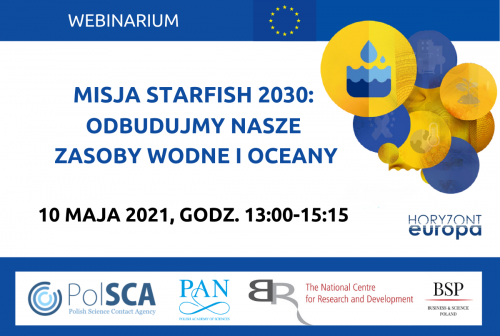As part of a joint initiative of the PolSCA Office and the representative office of the National Center for Research and Development (NCBR) in Brussels – Business Science Poland – on 10th May, an online meeting was held on one of the areas of European missions implemented under Horizon Europe. The Mission Starfish 2030 will support new ideas, research and innovation in the field of the protection of the aquatic environment.
The meeting called “The Mission Starfish 2030: Let’s restore our water resources and oceans” began with the presentation of the main goals and objectives of the mission by an expert from the European Commission – Ms. Helena Meyer (Directorate General for Research and Innovation). Afterwards, two discussion panels were moderated by Dr. Klara Ramm – member of the Mission Board for healthy oceans, seas, coastal and inland waters. On the side of the Polish Academy of Sciences, the discussion was attended by: Prof. Paweł Rowiński – Vice President of the Polish Academy of Sciences and recognized hydrologist and hydrodynamicist – and Prof. Jan Marcin Węsławski, director of the Institute of Oceanology of the Polish Academy of Sciences.
The other interlocutors were experts in the field of water policy and water protection, such as: Jan Piotrowski (responsible for the Vistula River in the Office of the Capital City of Warsaw), Piotr Bednarek (President of the Podkarpackie Naturalists Society Free Rivers), prof. Ewa Maria Siedlecka (representing the University of Gdańsk and the Polish Ecological Club) and Tomasz Konieczny (Director of the Center of New Technologies at MPWiK S.A. Wrocław).
In the discussion entitled “Regeneration of marine and water ecosystems: Restoration of rivers and waters” prof. Rowiński drew attention to the need for a modern approach to water management in Poland, which involves an integrated struggle with the greatest local problems: water quality and extreme phenomena such as droughts and floods. It should be part of the Green Deal policy leading to climate neutrality.
On the other hand, during the conversation on the eutrophication process of water, which occurs when there are too many nitrogen and phosphorus compounds in the water, prof. Węsławski stated that, among other things, the renaturalisation of Polish rivers will have a key impact on the condition of the Baltic Sea. However, we must bear in mind that it will be a long-term process. The professor also emphasized the uniqueness of the Polish coastline, with a sandy coast (functioning as natural water filters), low density areas and natural rivers. Taken together, this is a major asset and will help to be successfully used in the context of European research projects.
The debaters of both panels also pointed out several times to the need for good cooperation of natural, engineering and social sciences, especially when it comes to public consultations and citizen involvement.
The full agenda of the meeting (in Polish) can be downloaded here. The Mission Starfish 2030 Report is available here.
As part of the further cooperation between the offices of the Polish Academy of Sciences PolSCA and NCBR/BSP, more discussions are planned in the online format on other areas of the EU Missions in Horizon Europe. The next meeting – in the field of climate-neutral and smart cities – is scheduled for 21st June. We cordially invite all interested parties to participate. More information coming soon!



